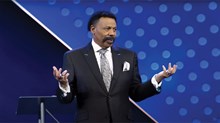Christian economists and policy advisers say they cautiously back the Senate's $700 billion bailout plan that would allow the government to buy troubled assets from financial firms.
The bailout package that included $150 billion in tax breaks passed the Senate Wednesday night, and the House is expected to vote on it today.
"I believe we've got to do something," said Richard Land, president of the Southern Baptist Convention's Ethics and Religious Liberty Commission. "From people who know a lot more about this than I do tell me, we're in the middle of what could be called an economic coronary thrombosis."
Land said on Wednesday that the Senate bill became progressively better every hour. He was pleased that the Senate's bill would curb executive pay, provide relief for another year from the Alternative Minimum Tax, and increase the amount covered by the Federal Deposit Insurance Corporation from $100,000 to $250,000, and set up oversight committees.
"I think a theological perspective would tell us that you have to have sufficient oversight over people and accountability," Land said. "If we believe in the sin nature, and I do, then some people are going to find the temptation to resist when there's no one holding them accountable."
Although some conservatives have called for market solutions rather than government intervention, Rusty Leonard, founder and CEO of Stewardship Partners Investment Counsel, believes that the government is the only entity that can deal with the scope of the economic crisis.
"They're ideologues and they don't understand the scope of the problem," Leonard said. "They understand their ideology but they don't understand how the system works."
John E. Anderson, professor of economics at the University of Nebraska, said that on one hand, firms should have to live with the trouble assets they acquired. On the other hand, the public benefits from well-functioning markets.
"There's a public good about this that means broad government involvement may be justified," Anderson said. "I'm cautiously optimistic that the solutions they're putting forward now are appropriate."
Sojourners' founder Jim Wallis believes the Senate made improvements that would protect taxpayers.
"The market cannot be trusted to protect the common good. Its job is to make money," Wallis said. "Government has to protect the common good."
Senators quietly tucked in several earmarks into the package, including a $2 million tax benefit to people who make wooden arrows for children and $192 million in rebates on excise taxes for the Puerto Rican and Virgin Islands rum industry. No bill is perfect, observers say, but they also have their own wish list.
Leonard would like to see the bill include provisions for the government to inject capital into troubled financial firms so confidence can be restored in the markets. Land believes the government should eliminate capital gains tax for two years and have federal reserve lower the interest rates in order to put money back into the markets. Wallis would like to see unemployment insurance extended, aid for homeowners facing foreclosure, and caps on executive compensation.
"It's a flawed bill, but it's a needed bill," Wallis said. "These should be investments, not just bailouts."
Copyright © 2008 Christianity Today. Click for reprint information.
Related Elsewhere:
CNNMoney.com explains the bill coming before the House in more detail.
Christian financial adviser Dave Ramsey told Christianity Today why he thinks the bill is a disaster.
CT also has special sections on the economic crisis and money & business.

Support Our Work
Subscribe to CT for less than $4.25/month


















